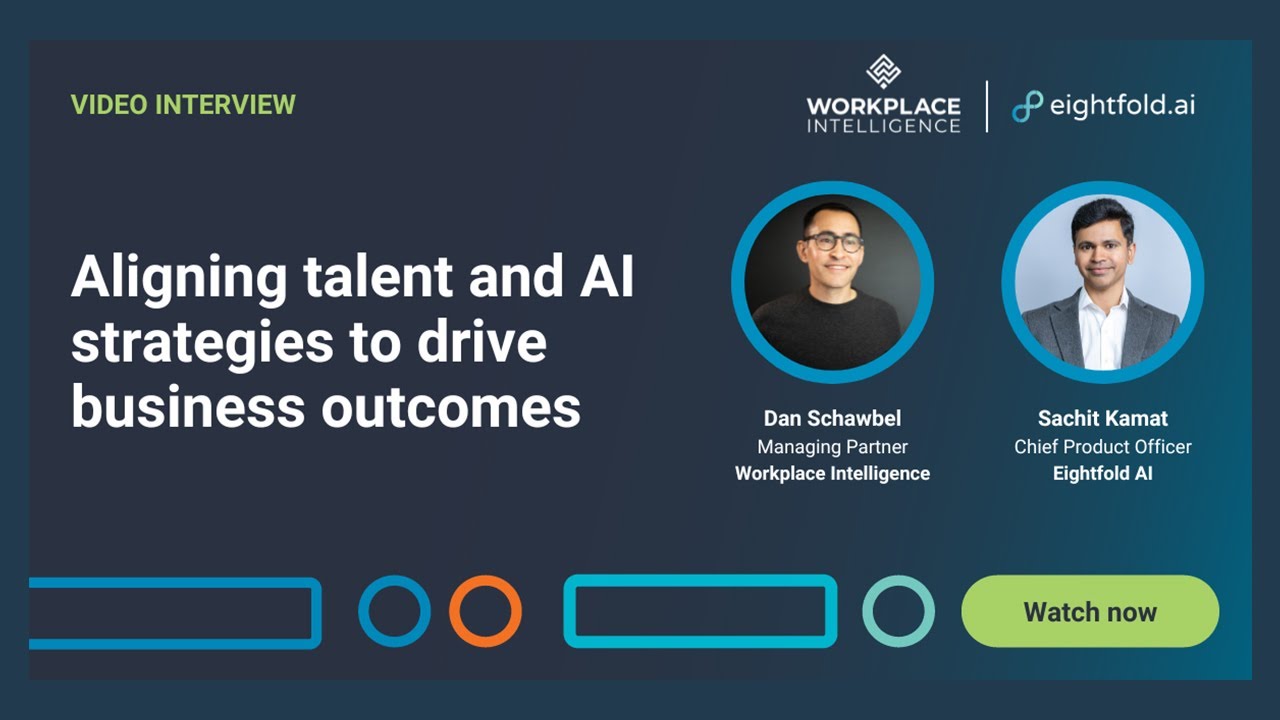In an era defined by technological acceleration and evolving workforce dynamics, the role of HR is undergoing a profound transformation. Traditional HR functions are increasingly being augmented and refined through the integration of AI-powered talent intelligence, a strategic approach that harnesses data-driven insights to inform workforce decisions. This shift is imperative for organizations aspiring to stay competitive in a rapidly changing business landscape.
Here, we explore the ways that talent intelligence can elevate the HR function, making it not only smarter in its decision-making but also adept at anticipating and navigating the challenges of the future of work.

Related content: Watch New York Times bestselling author and future of work expert Dan Schawbel interview Eightfold Chief Product Officer Sachit Kamit in this exclusive video about how talent intelligence can inform HR to make stronger workforce decisions.
Enhancing recruitment processes
One of the primary areas where talent intelligence shines is in the realm of recruitment.
Traditional hiring processes often rely on subjective judgments and limited data, leading to suboptimal talent acquisition. Talent intelligence, however, introduces a data-driven approach to recruitment, using AI algorithms to analyze résumés, assess candidates’ skills, and predict their potential fit within the organization.
By identifying relevant patterns and trends in hiring data, HR professionals can make more informed decisions, ultimately leading to the selection of candidates who not only possess the required skills but also align with the organization’s culture.
I spoke with Jason Cerrato, Vice President of Market Strategy at Eightfold AI, about putting talent intelligence to work. Cerrato said that talent intelligence allows you to look at skills and how skills relate to the work that needs to be done to expand your talent pool so that you can fill roles quicker.
“If you have a better understanding of the data, and you look at things like skills, you’re now able to understand the information in front of you to potentially come up with different outcomes and different solutions,” Cerrato said.
AI-powered technologies can also streamline the initial stages of the recruitment process by automating routine tasks such as résumé screening and candidate communication. This not only saves time for HR professionals but also ensures that the hiring team can focus on evaluating candidates based on their potential cultural fit, soft skills, and alignment with the organization’s values.
Predictive analytics for workforce planning
Talent intelligence, when infused with predictive analytics, empowers HR teams to engage in proactive workforce planning. AI algorithms can analyze historical data, industry trends, and internal performance metrics to forecast future talent needs.
This foresight allows organizations to identify critical skill gaps, anticipate turnover risks, and design targeted training and development programs. By staying ahead of workforce demands, HR becomes a strategic partner in driving organizational agility, ensuring that the right talent is in place to meet evolving business needs.
In my conversation with Sachit Kamat, Chief Product Officer at Eightfold, he said that once you have a baseline of your people’s skills and where you want to grow as an organization, you can plot a chart toward understanding what skills gaps need to be addressed to get you to your next milestone as a company.
“If you have a major initiative and you want to hire a few hundred salespeople who can make a transformation happen for your company, you now have time to see whether you have a pipeline of people within the company who can potentially be molded toward taking on that role in the future,” Kamat said.
For instance, if data analysis indicates an upcoming surge in demand for specific skills, HR can take preemptive measures such as upskilling existing employees, launching targeted recruitment campaigns, or exploring strategic partnerships to access the required expertise. This level of proactive workforce planning positions the organization to adapt swiftly to market changes and industry disruptions.
Employee development and retention
Talent intelligence plays a pivotal role in nurturing the professional growth of employees and mitigating retention challenges. By analyzing performance data, skills assessments, and career trajectories, HR can identify high-potential employees and tailor development plans to enhance their skills and prepare them for leadership roles.
This personalized approach to talent development not only fosters employee engagement but also ensures a pipeline of skilled individuals ready to step into key positions as the organization evolves.
Sania Khan, Chief Economist at Eightfold, said that by analyzing the skills data you have first, you have a better outlook on what you have, what you need, and can redeploy talent instead of having to conduct a layoff.
“Talent intelligence shows leaders what skills they need and help them determine the best approach for the future, whether that’s building your workforce, buying your workforce, or borrowing your workforce with contingent employees to acquire those skills,” Khan said.
Additionally, talent intelligence can help HR professionals understand the factors influencing employee turnover. By analyzing exit interviews, employee surveys, and performance data, HR can pinpoint areas for improvement in terms of workplace culture, leadership, or career-development opportunities.
Armed with these insights, organizations can implement targeted retention strategies, addressing root causes and fostering a more supportive and fulfilling work environment.
Diversifying and inclusive hiring
Diversity and inclusion are integral components of forward-looking organizations, and talent intelligence can play a vital role in advancing these initiatives. AI-driven tools can reduce unconscious biases in the hiring process by focusing on objective data and skills assessments. By analyzing hiring data over time, HR professionals can monitor diversity metrics, identify areas for improvement, and set measurable goals for creating more inclusive workforces.
Talent intelligence can also assist in the development of mentorship and career-advancement programs that support underrepresented groups within the organization. By understanding the unique challenges and opportunities faced by different segments of the workforce, HR can design initiatives that foster equal opportunities for career growth.
Ready to see how talent intelligence can make a difference in your organization? Request a demo today.

Dan Schawbel is a New York Times bestselling author and the Managing Partner of Workplace Intelligence, an award-winning thought leadership and research agency focused on the world of work. He is the bestselling author of three career books: Back to Human, Promote Yourself, and Me 2.0. Through his company, Schawbel has led over 70 research studies with major brands including Amazon, Oracle, Deloitte, American Express, and WeWork. As one of LinkedIn’s “Top Voices,” his Workplace Intelligence Weekly LinkedIn newsletter is one of the most read in his industry with nearly 400,000 subscribers and over 200,000 students who have taken his LinkedIn Learning courses on leadership, management, and hybrid working.
